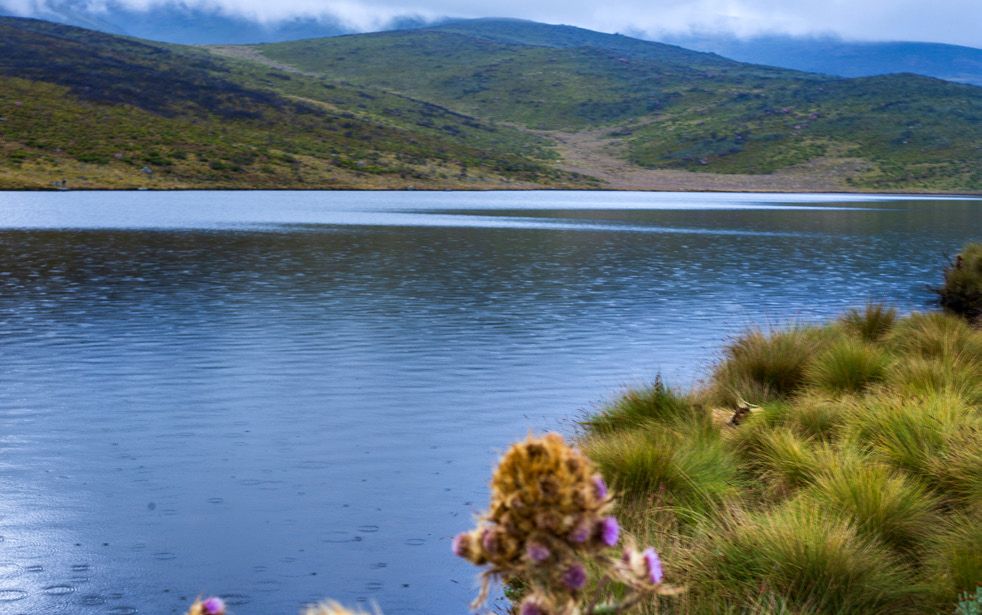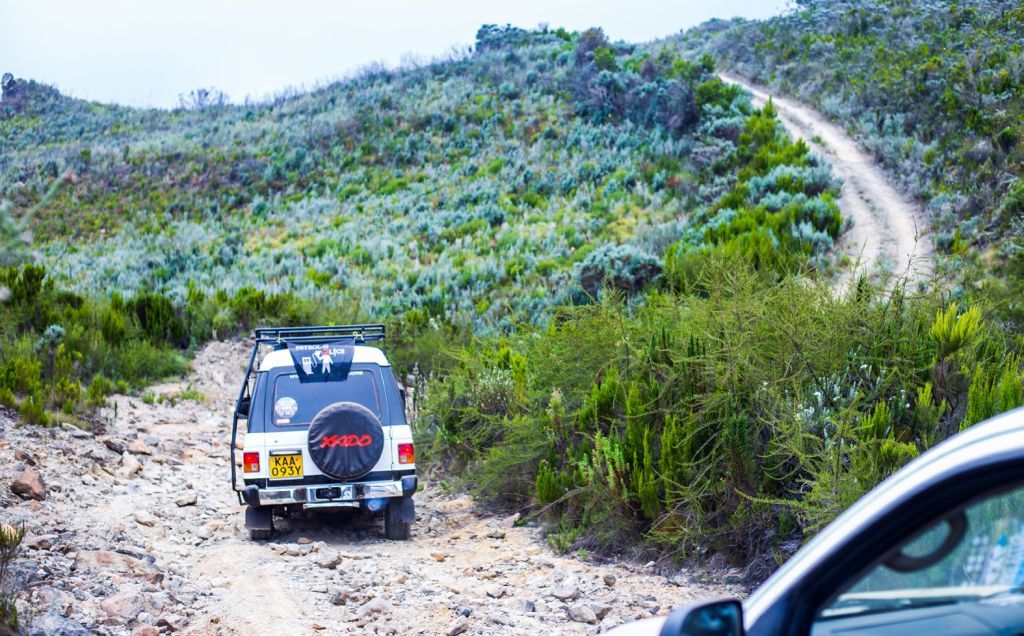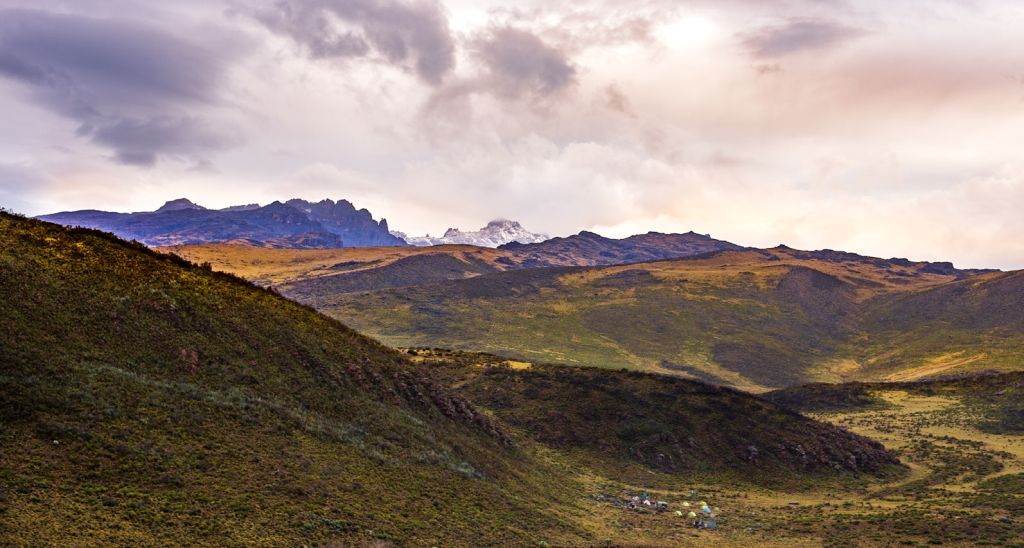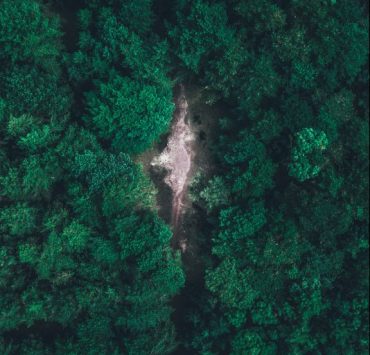Our Journey to the Lake Called Ellis – Mount Kenya

Chioma Phillips is the Editor of Msingi Afrika Magazine and…
Towards the end of January 2021, news of a planned trip to Lake Ellis in Mount Kenya area reached my husband and I. An adventure beckoned! Who were we to resist? Especially since – for various reasons – that famous mountain had been on our minds in the days immediately preceding that news. Excitedly, we confirmed our participation and began to make the necessary arrangements: warm clothing, things to cook with, things to cook and so on; after all, this was going to be an off-road camping trip and we had to be prepared. We stretched our coins, borrowed what couldn’t be bought and made ready as much as one can for the unknown.
One thing that niggled at us was the name of this place… after all, the name Ellis wasn’t one found in the annals of Afrikan nomenclature. What on earth could have brought this about? Located 3455meters or 11335.3 feet above sea level, at the foot of Mugi Hill in the undulating landscapes that immediately surround Mount Kenya, is Lake Ellis. The lake was named after Thomas Evelyn Scott-Ellis who was said to have been the first European to reach the lake in 1927. The name Ellis is derived from the name Elias which is the anglicized form of the name Elijah. More on that later.
About Mount Kenya
Mount Kenya is the second highest mountain in Afrika and is home to a diversity of flora and fauna, a collection of 31 lakes and tarns (tarns are glacial lakes), a wonderful collection of hills, valleys and multiple peaks which are pyramidal in nature. The three highest being (in ascending order) Lenana (4985m/16,355ft), Nelion (5188 m/17,022ft) and Batian (5199m/17,058ft). Nelion and Batian are misspellings of Nelieng and Mbatian and Lenana is an anglicization of Olonana. The three were prominent Maasai: Mbatian was an Oloibon (Laibon: Spiritual Leader, Prophet. This was not a political role.) of the Maasai community. He is referred to as their greatest spiritual leader, his tenure marked by peace, prosperity, increase and harmony among the Maa people. Mbatian prophesied about the coming of the white men and the railway line and cautioned his people not to move out of their ancestral lands, lest they die of smallpox and their cattle perish. Nelieng was his brother and Olonana, Mbatian’s second son who also became an Oloibon. Much like Jacob, Olonana successfully tricked his father into giving him power instead of his older step brother Senteu, sparking division and conflict between the brothers and the Maasai people, which weakened them over time. Olonana went on to befriend the British and became their unwitting pawn in eliminating pastoralism from the lands that they wanted to use for farming… effectively limiting the mighty Maasai to reserves and later into reducing the sizes of the reserves. Olonana was welcoming to the American missionaries, who he expected would introduce useful skills to his people, but they too, uneasy with the idea of nomadic pastoralist life, began to teach his people farming. His was a tragic decline in glory and favor with his people. These three peaks’ names were suggested by Sir Halford John Mackinder in 1899 on the recommendation of Sidney Langford Hinde who was the resident officer ‘in charge’ of Maasai land at the time of Mackinder’s expedition. Those who wrote these things down claimed Mackinder was the first person to ascend to the top of Mount Kenya.
Mount Kenya is also home to the elusive black panther, that beautiful dark-skinned leopard made famous by the movie… and since 1997 has been on the list of UNESCO World Heritage sites. The mysteries of Mount Kenya we will leave for another day, except to say that this is where the country of Kenya eventually drew its name… an anglicized mispronounced form of the original name of the mountain known as Kirinyaga/Kii nyaa/Kirenyaa/Ol Doinyo Keri/Ol Doinyo Eibor/Ol Doinyo Egere, in the various local languages of the people who interacted with the mountain. The name itself meaning the striped mountain and also a reference to the feathers of a male ostrich in comparison to the black and white coloration of the mountain and its peaks. And that it retains spiritual significance to the people of the mountain to this day. Of the name and purpose of the country, you can read more in our story on Kenya in Issue One of Msingi Afrika Magazine.
Our journey took us northwards from Kajiado County through Nairobi County to Kiambu County then through Murang’a, Kirinyaga, Embu, Tharaka Nithi counties and past the equator to Meru County. A total distance one way of about 250kilometres, and a journey which we broke into three stages, spending the first stage in Nairobi and the second in a quiet little tavern called Patmos Island in Meru where, for a little less than USD 20 we got a clean bed, a hot shower and breakfast for two the following day. We were traveling in our brother Mike’s car, a hardy twenty-something-year-old Pajero, which, under his skilled handling got us to locations many didn’t reach. After breakfast we went and joined the rest of the brave expeditioners who intended to face the great unknown together.

The intended route for our ascent was a gate recently opened by the Meru County government through an area called Themwe. Most people who want to make the ascent in the Tharaka Nithi/Meru area opt for the Chogoria route, which offers a smoother ride to the gates of the forest but for the extreme off-roaders in our midst, there is no better stretch of road for putting your machine to the test than this. Steep hills, boulders, mud, corners and narrow turns will keep you fully engaged, while your passengers get their breath taken away by the spectacular scenery or have their imaginations stimulated by the mysterious shadows in the forest when you stop to negotiate a particularly tricky bend. (That’s assuming no one goes to ‘domesticate’ the road). Even the most seasoned in the group approached the climb with respect – after the first few kilometers of this relatively untapped route began to claim its victims. The most impatient and arrogant were all schooled by this journey.
Ascending to Lake Ellis
From the gate to Lake Ellis you travel approximately 20km, give or take, but it took us hours to get there as vehicles kept blocking the road due to overheating or the need to patiently and with all care navigate the trickiest sections along the route. But we didn’t mind all the stops, it actually made no sense to us to rush the journey and miss all the scenic beauty that God took special care to dot the landscape with. Even so, many a shot were missed along the way, which we hope to be able to revisit and capture for posterity. We were informed that people might have been rushing to make the ascent in order to claim the best spots… the rush and culture of ‘modern living’ haunting us even here in this most serene of environments.
At some point in the journey, there were people who were overtaking others in the forest, crushing plants along the way, in a bid to pass those who had stopped ahead of them due to mechanical issues – not so much in a bid to help them overcome their unexpected hardships. This was sad to see – but there were those who did stop to help and remedy the situation by offering expertise at repairing or strength to tow our fellow travellers out of the places where they found themselves stuck. That’s a metaphor for life’s journey I suppose – you sometimes find those who would rather take photos of you in your plight than help you out of it, but there will be others whose hearts are tender towards you and your difficulties and who will remember you, no matter what. Why was it that no one wanted to just be still and leave the rush of daily living behind? It boggles the mind. Especially since once those who made it to Lake Ellis set up their tents and then sat down to drink, roast meat and play loud music. Nothing much different from what they do on a regular weekend in town or in the city. Perhaps some have forgotten the power in stillness.
Lake Ellis

Lake Ellis is beautiful. It’s not a large lake but it is said to be good for trout fishing. Stop and think about that for a moment – fish in a lake on the mountains. The area is mostly still and calm and surrounded almost all the way around by hills. There are no trees in sight as the area is mostly moorland. It’s too high for the elephants that frequent the forests below us but enjoys some bird life.
As is typical of mountains, the weather at Lake Ellis is very unpredictable, one doesn’t know moment to moment what will visit them from above and we found out firsthand just how much the clouds love to share their moisture with the mountains. That night was spent partly searching for our tents and sleeping bags, partly seeking shelter from the rain and for the most part, shivering in discomfort as we learnt that our tents and sleeping bags were actually designed for summer and dry weather, rather than mountains, cold and rain. It was a cold, wet night. The kind where you don’t know whether you’re asleep or awake but you are fully aware that you did not carry enough provisions to deal with the environment that you encountered. But that too had its benefits for my husband and I, as the early morning found us still shivering with muscles stronger then than when we first went to bed. Our discomfort drove us out of our tents before most people were awake and led us to one of the most precious of discoveries.
The evening before was so overcast that every attempt that we made to find the promised Point Lenana that we had been told was visible from the campsite yielded nothing more than a gray tinted thick blanket of cloud. It was as if this mountain was shyly hiding her face behind a cloudy veil. So we abandoned the quest and went on with our activities, eventually going to bed after gazing delightedly at the portion of the starry night skies that was visible against the bright lights of the camp. Even with the lights, we were able to see so many more stars than one can in an urban area. Then came the dawn and what was easily the highlight of the journey for me.
My husband was helping me find a suitable spot to sort out some administrative matters and so we walked up the muddy incline, which every vehicle had driven down the day before, scouting for a location. We had just found a potential position when I looked up and suddenly saw this striped mountain staring right back at me! Just beyond the hills to the south of our camp, there it was, Point Lenana, boldly on display for a few minutes, before ducking behind the clouds once again. My husband dashed down to grab our equipment so that we could do what we could to capture that moment in time.

That mountain, forged eons ago by fire, made up of cooled molten rock which had been pushed outward and upward by the powerful contractions of the womb of the earth, that mountain, which was connected to the ancient peoples of Afrika, that mountain which we knew was still kilometers away and thousands of feet higher than us stared down at us from its third highest point in the sky. In that still, quiet moment, as the camp still slept, I felt what the ancients must have felt, a type of awe and wonder and a sense of worship and reverence – not for the mountain – for she and I poured forth from the same Source and Power. My reverence went up to the King of kings, the Lord, the Creator of all in wonder at His awesome, majestic power… and I wonder, even as I write this, could this be what they knew all those ages ago? The ones who came before us I mean. The ones who were called primitive and told they were worshiping a rock when in actual fact the ignorant foreign observers did not know Who it was they called upon. Did they know that they were a part of something so much greater than themselves that words could barely frame what their hearts knew inside to be true? Is that why they offered sacrifices of goats and sheep to the One, the Maker, the Creator of all who in certain languages of the people of the mountain was called Mwene Nyaga – the Owner of the Ostriches, referring to that high mysterious humbling mountain peaks? Is that why they were able to connect their understanding of their Creator to the Words captured in the Bible when the missionaries came along? Not that they were duped but that they recognized a strand of something they had connected to and wanted more of? Standing there worshiping not the rock and not themselves – as some in error have led themselves to believe – but worshiping He Who gave them life, strength, health, cattle, He Who gave them sons and daughters, He Who looked after and protected and watched over them and gave them good harvests and healed them. He Who gave them access to Himself. “He Who Causes That-Which-Is To Be & He Who Causes That-Which-Can’t-Be To Fall” which is the meaning of YHVH according to Abarim Publications. Did they know what we discovered that day? That God’s presence is there.
Small wonder we were taken to the waters of Lake Ellis, in the month of purification to purge the idols from our hearts and land as Elijah did in his day. Ellis, the name derived from Elias, which in turn is derived from Elijah which is derived from Eliyahu, which means “Yah is God” or “Yah is my God”. To re-acknowledge Who He is in concord with those of the raised land of ‘Ka’. AfriKA! Those with hands outstretched to God.
In that moment, time stopped, we stepped into eternity and connected with the Divine nature and awe-inspiring power and presence of the Almighty and worshiped Him… with hands outstretched to Him, reconnecting the ancient streams and lines that unite Heaven and earth, God and man and His creation. In that moment, we got back what had been stolen from us by the ones who told us we were backward, ignorant, illiterate and without a spiritual connection to our Maker, the Father of the Lord Jesus Christ… and we commanded AfriKa and her people back into alignment with Him – and nothing and no one can ever take that away from us again.
Descending Lake Ellis
For our descent from the lake, we chose to use the Chogoria route, which, before you reach the base camp has some sections of road that demand some of your best offroading techniques and expertise – depending on the weather. The landscape and scenery make you want to sit still for hours, saying nothing as you listen to what the ancient gigantic trees will whisper to the wind of the things they have seen for thousands of years and what they see today. That’s my way of saying that it is absolutely and totally breathtaking in its beauty – and a rushed trip there won’t do it justice. We eventually reached the smoother road I mentioned earlier, but keep in mind if you choose that route, elephants do use it from time to time so do drive carefully.
When in 2019 we shared our experience of visiting Marsabit, we pointed out that every journey has a purpose, I just want to highlight here that it is not a purpose that is restricted to road trips – but more than that it is that every life’s journey has a purpose – perhaps – if you haven’t already – you can find yours in the stillness.
What's Your Reaction?
Chioma Phillips is the Editor of Msingi Afrika Magazine and the host of Msingi Afrika Television. Her hope is to see the Truth shared, with all who will listen, for the transformation of the people and the continent of Afrika - and the world. She believes passionately in the critical role that Afrika and Afrikans have to play on earth right now and hopes to ignite the spark that will cause them to see and believe who they are, so that they can live out their Truest lives for the remainder of their days.


















